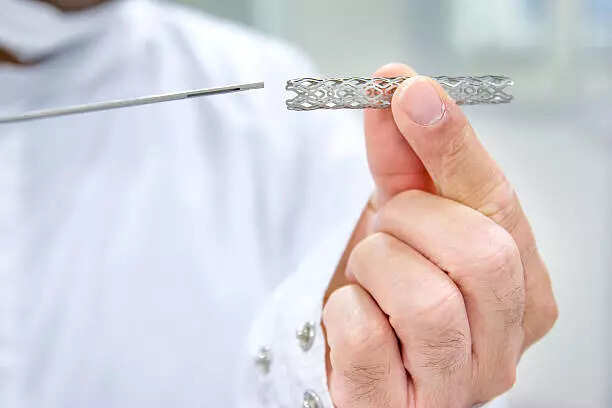[ad_1]

New Delhi: The Gujarat government’s new pricing model for drug-eluting stents, covered under the public insurance scheme, has sparked strong criticism from domestic device manufacturers in India.
Drug-eluting stents (DES) are used to treat heart artery blockages. Under the updated price structure notified by the state government, USFDA-approved stents are capped at Rs.25,000 per stent, while those approved by the domestic regulator are capped at Rs.12,000 per stent.
Following the formal procedure, a letter issued by the nodal authority to Bajaj Allianz General Insurance described the decision as a measure “to maintain cost-effectiveness while ensuring high-quality patient care.”
However, the move has faced strong opposition from domestic manufacturers. Criticising the decision, the industry body Association of Indian Medical Device Industry (AiMED) called the pricing mechanism deeply discriminatory and a mockery of the ‘Make in India’ initiative.
The organization stated, “The move is seen as helping American MNCs regain their lost market share at a more favorable and profitable reimbursement rate, while domestic manufacturers are being systematically forced out of the market in their own country. It also undermines India’s medical regulatory system.”
According to AiMED, this move contradicts globally followed practices. “Indian manufacturers export over 5 lakh stents annually to more than 100 countries, including Germany, the UK, and Switzerland, where such artificial price differentiation based on USFDA approval is not applied,” the body noted.
Voicing their concerns, last week, AiMED’s Forum Coordinator, Rajiv Nath, wrote a letter to Gujarat’s Chief Minister, Bhupendra Patel, demanding a rollback of the notification.
An annexure shared with the letter claims, “MNCs bill hospitals at ₹25,000 (the official reimbursement price) to appear compliant but issue credit notes of ₹12,000 to ₹13,000 per stent, effectively reducing the actual selling price to ₹12,000.”
“This additional ₹12,000-13,000 is passed on to hospitals as an incentive to ensure they procure stents only from these MNCs. Indian manufacturers cannot compete because they lack the margins or engage in unethical practices to offer such backdoor incentives,” it added.
Strikingly, earlier this week, a report from the United States Trade Representative (USTR), which oversees US international trade policy, flagged that “price caps on coronary stents and knee implants in India have not been increased in line with inflation and do not differentiate based on the cost of production or technological innovation, which dissuades US companies from serving the market.”
The report which analyses country-wise trade policies has also flagged several regulatory concerns like abscess of guidelines for importing refurbishment devices is further limiting US exports access to Indian markets.
Currently, India fulfills 80-85 per cent of its medical device requirements through imports, where global MNC including the US have a major hold..
According to government data, in FY23-24, India’s medical device import bill rose by 13 per cent to reach ₹69,000 crore.
[ad_2]

